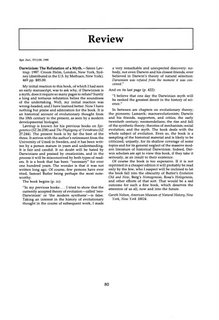
Another scholar takes the Darwinian mind at its own words:
The book begins (p. ix):(Darwinism: The Refutation of a Myth
“In my previous books... I tried to show that the currently accepted theory of evolution—called ‘neoDarwinism’ or ‘the modern synthesis’—is false. Taking an interest in the history of evolutionary thought in the course of subsequent work, I made a very remarkable and unexpected discovery: nobody, not even Darwin and his closest friends, ever believed in Darwin’s theory of natural selection: Darwinism was refuted from the moment it was conceived.”
And on its last page (p. 422):
“I believe that one day the Darwinian myth will be ranked the greatest deceit in the history of science.”
Reviewed by Gareth Neslson
Systematic Zoology, Vol. 37, No. 1 (Mar., 1988) :80)
It was Richard Dawkins who noted: "It is almost as if the human brain were specifically designed to misunderstand Darwinism, and to find it hard to believe..."
Isn't it ironic.
Note that all a scholar has to disagree with to come into disagreement with Darwinism is the assertion that historical claims or mythological narratives of Naturalism about random variation and natural selection explain the organization of all organisms. I.e. the Darwinian assertion is that organisms learning and designing is an illusion. Note how it is not apparent how the Darwinian mind designed its statement to contain any meaning or purpose, yet it imagines it is so.
The anti-Darwinian notion that they have "emergent properties" that are vital to their existence or which shape their evolution is also said to be false, nor do organisms make any choices with respect to how they will organize. Instead the explanation for their whole being is their evolutionary history, which Bios/Life has no role in because all "selection" comes from an inanimate environment given natural selection. Isn't it ironic that Darwinism is anti-biological and cannot explain the origin of Life, nor much of the organization typical to it either. It seems that the most unnatural thing to the Darwinian mind is Life itself, naturally enough. Given its failure to study Life the claims of the Darwinian mind are more historical than biological, e.g.
The viewpoint of Coyne et al. (1988) is one in which past events are argued to explain, in a causal sense, the world around us. Such explanations cannot be verified or tested, and the only biological observations they require are that variation and differential reproduction occur. [I.e., "Things change or somethin'."] This is not a caricature, as a reading of Coyne et al. will verify. [Those with the urge to merge will claim that all definition is false, including their own. I.e., "Strawman, I say!" And if you pin down their mind with their own texts and language then they will snivel about "quote mining," "semantics" or "rhetoric" as definition brings an end to their merging.] In keeping with this general viewpoint, proponents claim that species are explained with reference to history. Important characters are hence “mechanisms” that have established and maintained the separation between diverged lineages of an ancestral population. According to Coyne et al., even the adaptive purpose of the changes that resulted in these mechanisms is irrelevant.(Points of View
We would ask where biology enters into this schema. The answer is that it does not. Rather, biology is interpreted in terms of a range of historical processes, including selection of variation over time. This could, with equal relevance, be used to understand any nonbiological phenomenon such as the development of the automobile, agricultural methods, culture, or men’s suits (Lewontin, 1976).
[...]
Let us outline the terms of the disagreement so as to avoid any possible confusion. Within contemporary biology it is commonly argued (e.g., Mayr, 1988) that, in order to maintain the distinctness of species, their integrity must be protected. This protection will have evolved as a result of a history of natural selection on individual genes and characters that have the “function” or “effect” (sensu Williams, 1966) of isolating one species from another. The isolation concept of species is, therefore, not separable from such a historical approach to biology. According to this viewpoint, species are only understandable in terms of history, as Mayr (1988) so correctly recognized.
In contrast, our view is that the biological-process of mate recognition results in species self-definition, and mate recognition represents the most appropriate basis for the delimitation of particular species (Michaux et al., 1990). Rather than regarding mate recognition as a set of independent traits that isolate species, we view it as a highly integrated communication system. As such, it is not amenable to selectionist and/or reductionist analyses. In a more general sense we suggest that biology should have primacy over historical scenarios (Lambert et al., 1989). That is, although we acknowledge that all attempts to investigate the world are colored by theoretical perspectives, we strongly believe that explanations should derive from knowledge of demonstrable biological phenomena rather than historical suppositions.
Species and Neo-Darwinism
By C. S. White; B. Michaux; D. M. Lambert
Systematic Zoology, Vol. 39, No. 4. (Dec., 1990), :400-401)
No comments:
Post a Comment